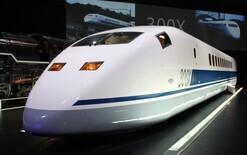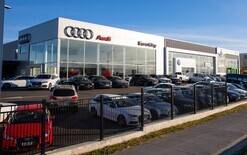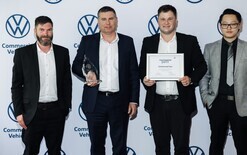Hyundai reveals next-gen fuel-cell SUV
Posted on 17 August, 2017
Hyundai Motor has offered an early glimpse of its next-generation fuel-cell vehicle, well ahead of the hydrogen-powered SUV’s official launch early next year. At a special preview event held in Seoul, the yet-to-be-named SUV previews Hyundai’s second commercially produced hydrogen model and uses the company’s fourth generation of hydrogen fuel cell technology developed on four key pillars that focus on fuel cell system efficiency, performance, durability, and tank storage density.
“With exceptional efficiency, serene styling, and uncompromised performance, our next generation fuel cell SUV is the true epitome of an eco-friendly vehicle of the future,” Lee Ki-sang, Senior Vice President of Hyundai Motor Group’s Eco Technology Centre, says. “Hyundai Motor will take lead in developing and producing green energy vehicles that would ultimately complement a near-zero emission society.”
By enhancing fuel cell performance, reducing hydrogen consumption, and optimizing key components, the vehicle’s efficiency is greatly improved compared to the its predecessor, the ix35 Fuel Cell. The new SUV boasts an efficiency level of 60 per cent, or a 9 per cent increase from the ix35’s 55.3 per cent. With enhanced system efficiency, the new model targets a driving range of more than 580km on a single charge.
The new model’s maximum output is enhanced by 20 per cent compared to its predecessor, boasting an impressive 163PS (119kW) of power. The fuel cell SUV also improves the car’s cold start capability, overcoming the challenges of starting fuel cell vehicles in temperatures below freezing point.
By employing highly durable catalyst technology, the new hydrogen-powered SUV ensures even greater longevity than its predecessor.
The next generation hydrogen vehicle makes significant improvements in tank storage density. The tank package now features three equally-sized tanks, as opposed to two of different sizes. World-class tank gravimetric capacity (hydrogen storage mass per tank weight) was achieved through innovations to the plastic liner configuration and efficient layering pattern, which resulted in a reduction of thickness.
The mass-produced new vehicle will also feature advanced driver assistance technologies.
Hyundai says it will take a multi-pronged approach to its eco-vehicle program. The company is committed to a future vehicle line-up comprising a variety of powertrain options – electric, hybrid and fuel cell – to suit customers’ varied lifestyles.
Spurred on by greater global demand for fuel-efficient, eco-friendly vehicles, the brand’s goal is to lead the global popularisation of hybrid vehicles, expanding its lineup to SUVs and large vehicles. Another part of the plan is the development of 4WD and FR (Front Engine Rear Wheel Drive) variants, building on its proprietary Transmission-Mounted Electrical Device (TMED) system, which was developed in 2011.
While Hyundai continues to develop its leadership of the electric vehicle market with its current IONIQ model, the company also aims to establish a lineup ranging from small EVs to large Genesis-brand models. Hyundai’s electric vehicle development will take place in multiple phases:
• Launch of EV version of the Kona compact SUV, with range of 390km in first half of 2018
• Launch of Genesis EV model in 2021
• Launch of long-range EV, with 500km range after 2021
Hyundai will reveal the SUV early next year in Korea, followed by the North American and European markets.





